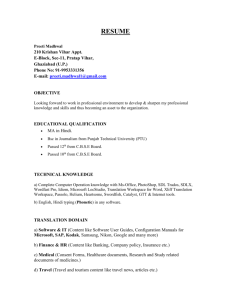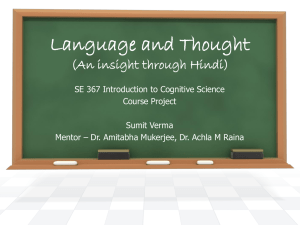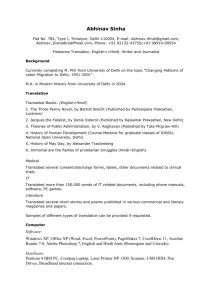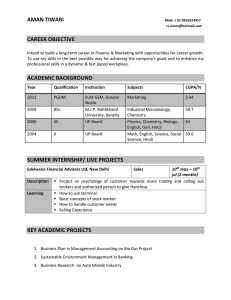Globalization and Languages: Building on our Rich Heritage
advertisement
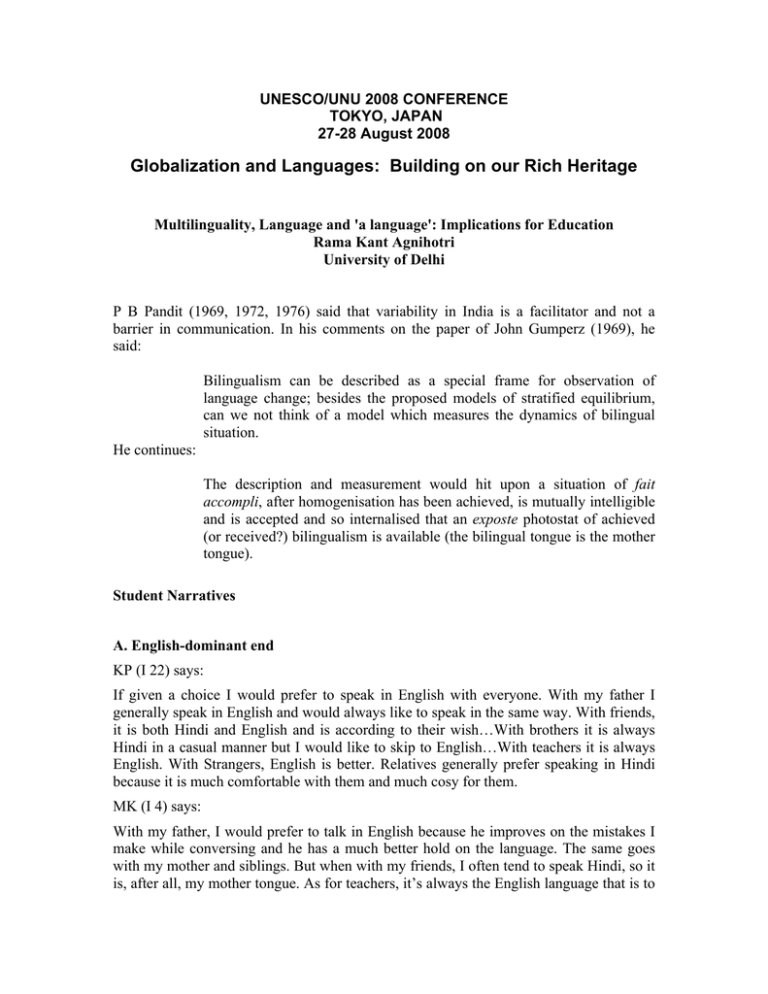
UNESCO/UNU 2008 CONFERENCE TOKYO, JAPAN 27-28 August 2008 Globalization and Languages: Building on our Rich Heritage Multilinguality, Language and 'a language': Implications for Education Rama Kant Agnihotri University of Delhi P B Pandit (1969, 1972, 1976) said that variability in India is a facilitator and not a barrier in communication. In his comments on the paper of John Gumperz (1969), he said: Bilingualism can be described as a special frame for observation of language change; besides the proposed models of stratified equilibrium, can we not think of a model which measures the dynamics of bilingual situation. He continues: The description and measurement would hit upon a situation of fait accompli, after homogenisation has been achieved, is mutually intelligible and is accepted and so internalised that an exposte photostat of achieved (or received?) bilingualism is available (the bilingual tongue is the mother tongue). Student Narratives A. English-dominant end KP (I 22) says: If given a choice I would prefer to speak in English with everyone. With my father I generally speak in English and would always like to speak in the same way. With friends, it is both Hindi and English and is according to their wish…With brothers it is always Hindi in a casual manner but I would like to skip to English…With teachers it is always English. With Strangers, English is better. Relatives generally prefer speaking in Hindi because it is much comfortable with them and much cosy for them. MK (I 4) says: With my father, I would prefer to talk in English because he improves on the mistakes I make while conversing and he has a much better hold on the language. The same goes with my mother and siblings. But when with my friends, I often tend to speak Hindi, so it is, after all, my mother tongue. As for teachers, it’s always the English language that is to be used. It comes in a way as being more sophisticated if we speak in English with our teachers. B. Fairly strong multilingualism JA (I 2) says: I would like to speak in Hindi to my father, mother and relatives because according to me the other person whom you are conversing with should also feel easy, natural and free enough to converse with you. However, with my brothers, cousins or my sister I would like to converse in English because I feel they are quite comfortable at it. With my teachers, of course, I would like to converse in English mainly because of the subject of my study. Strangers, I think should be talked to in English, so as to leave a good impression on them. SV (I 28) says: As I am educated in an English medium school so we were supposed to speak English all the time…prefer to talk to strangers in English if they seem to be literate or else Hindi…friends and relatives, both English and Hindi…though we are Panjabis, I can only understand it…with parents Hindi even though my father and mother are very much literate… C. Very strong multilingualism PD (I 1) says: I would like to speak in English because by doing so, I will be more fluent in English and it will also help me to learn more about English and being an English Honours student I always try to speak in English. But, with my brother, sister, relatives, I will want to speak in Hindi only; and with my friends, I speak in Haryanvi because we enjoy a lot by speaking in this language. MM (I 3) says: With my mother I will love (to) speak only in Bhojpuri because for me it sounds (more) closer than Hindi and English…I would like to speak in either Bhojpuri or Hindi to my father…With my friends, I usually speak in English and Hindi …but if friends intend to speak in Bhohpuri (may belong to same place), I will love to do that…with relatives, in Hindi and English…with strangers, according to the person… HKW (I 27) says: To father, I wanna speak to him in Panjabi because we belong to Sikhism; so there is an existence of our mother tongue. To mother, I want to speak to her English more fluently than right now so that it may balance out the atmosphere of being a literature student… To brother, sisters and relatives, Panjabi…To teachers and strangers, Hindi…To friends, even now we speak in English but I want them to talk in Hindi so that they get attached to their national language… SNP (I 26) says: Since Hindi is my mother tongue and I’ve learnt it at my home, I feel very comfortable to use it while talking to my parents. In school, I learnt English; therefore while relating to friends and siblings, I prefer English. Hindi is also my language with my friends and siblings. Some of my relatives hardly know any other language but Bhojpuri…I like this language as I’ve been using this since childhood. With my teachers and strangers, English is quite comfortable being an international language. Also to sound formal I love using English. HP (I 8) says: My parents understand all these languages (i.e. Panjabi, Hindi and English) but I communicate with them in Panjabi only. All my relatives live in Panjab but with the relatives who live abroad I speak in English. With teachers, it is a choice. If they speak in English, I have to speak accordingly. All my friends don’t understand Panjabi. That’s why I speak in Hindi. BJ (I 6) says: If I had the choice to select the languages, I’ll select Hindi and English because I know English but I am not fast in speaking it…So far as the case of Hindi is concerned, being a National Language of India, it is always neglected. My father is a Hindi teacher, so I want to speak as him. Whenever he speaks he never uses English words…Moreover I’ll try to use Maitheli as much as possible with my family members as because it is my mother tongue…I love to speak Bengali more than above languages as because it’s a very beautiful language and have a good culture. So whenever I find any stranger a Bengali, I start talking with him in Bengali. It makes me feel Indian. • Grassroot multilinguality • Pressures of globalisation and English • Implications of contemporary technology • Local strengths • Multilinguality as a site for subversive voices, struggle against linguistic stereotypes and a pedagogy where it is a resource, strategy and a goal.

